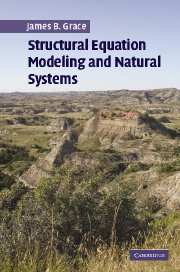Book contents
- Frontmatter
- Contents
- Preface
- Acknowledgments
- PART I A BEGINNING
- PART II BASIC PRINCIPLES OF STRUCTURAL EQUATION MODELING
- PART III ADVANCED TOPICS
- 6 Composite variables and their uses
- 7 Additional techniques for complex situations
- PART IV APPLICATIONS AND ILLUSTRATIONS
- PART V THE IMPLICATIONS OF STRUCTURAL EQUATION MODELING FOR THE STUDY OF NATURAL SYSTEMS
- Appendix I Example analyses
- References
- Index
6 - Composite variables and their uses
Published online by Cambridge University Press: 04 December 2009
- Frontmatter
- Contents
- Preface
- Acknowledgments
- PART I A BEGINNING
- PART II BASIC PRINCIPLES OF STRUCTURAL EQUATION MODELING
- PART III ADVANCED TOPICS
- 6 Composite variables and their uses
- 7 Additional techniques for complex situations
- PART IV APPLICATIONS AND ILLUSTRATIONS
- PART V THE IMPLICATIONS OF STRUCTURAL EQUATION MODELING FOR THE STUDY OF NATURAL SYSTEMS
- Appendix I Example analyses
- References
- Index
Summary
Introduction
It would seem that structural equation modeling holds the promise of providing scientists the capacity to evaluate a wide range of complex questions about systems. The incorporation of both conceptual and observed variables can be particularly advantageous by allowing data to interface directly with theory. Up to this present time, the emphasis in SEM has been on latent variables as the means of conveying theoretical concepts. It is my view that this is quite limiting. As we saw in the final section of Chapter 4, causal relationships in a model may deviate quite a lot from the stereotypic “hybrid” model. In the current chapter, I discuss the use of an additional variable type, the composite, in structural equation models. In simple terms, composite variables represent the influences of collections of other variables. As such, they can be helpful for (1) representing complex, multifaceted concepts, (2) managing model complexity, and (3) facilitating our ability to generalize. In my experience, these are all highly desirable capabilities when representing ecological systems and, as a result, I frequently find myself including composites in models.
While long recognized as a potentially important element of SEM, composite variables have received very limited use, in part because of a lack of theoretical consideration, but also because of difficulties that arise in parameter estimation when using conventional solution procedures. In this chapter I tackle both the theoretical and practical issues associated with composites.
Information
- Type
- Chapter
- Information
- Structural Equation Modeling and Natural Systems , pp. 143 - 180Publisher: Cambridge University PressPrint publication year: 2006
Accessibility standard: Unknown
Why this information is here
This section outlines the accessibility features of this content - including support for screen readers, full keyboard navigation and high-contrast display options. This may not be relevant for you.Accessibility Information
- 1
- Cited by
